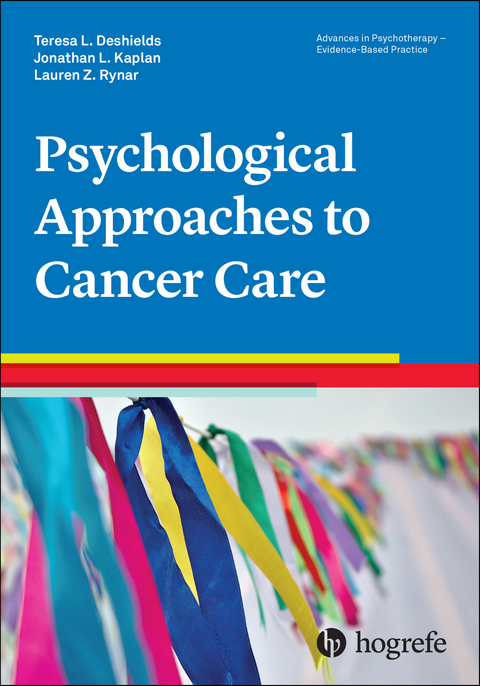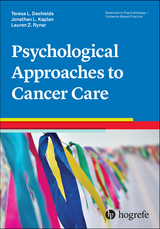Psychological Approaches to Cancer Care
Hogrefe Publishing (Verlag)
978-0-88937-511-6 (ISBN)
Multidisciplinary authors provide a holistic overview
Details the key principles and models of cancer-related distress
Guides through assessment and treatment
Illustrated with case studies
Printable tools for clinical use
Psychosocial oncology is a health psychology specialty that focuses on the psychological, behavioral, emotional, and social challenges faced by patients with cancer and their loved ones. Cancer can cause significant distress, and psychosocial interventions are known to be effective for helping patients and families navigate the many issues that can arise at any stage of the cancer continuum. This volume provides psychologists, physicians, social workers, and other health care providers with practical and evidence-based guidance on the delivery of psychological interventions to patients with cancer. The multidisciplinary team of authors succinctly present the key principles, history, and theoretical models of cancer-related distress. They then move on to explore clinical assessment and interventions in cancer care, in particular psychological and psychiatric treatments, multidisciplinary care management, and complementary supportive interventions. Case vignettes give the reader insight into diagnostic processes and effective treatment planning. Practitioners will find the printable handout and screening tool for clients invaluable in their daily work.
Teresa Deshields, PhD, is the director of supportive oncology at Rush University Cancer Center and a professor in the Department of Psychiatry and Behavioral Sciences and the Department of Medicine at Rush University Medical Center. She is a fellow and past president of the American Psychosocial Oncology Society. As a clinical health psychologist her clinical practice is devoted to treating cancer patients and survivors and their family members throughout the cancer continuum - diagnosis, treatment, survivorship, end of life, and bereavement. Her research is focused on issues related to symptom burden and quality of life in cancer patients and survivors. Jonathan Kaplan, PhD, is an assistant professor in the Departments of Psychiatry and Behavioral Sciences and Internal Medicine at Rush University Medical Center. He is the psychiatrist for the Rush University Cancer Center and a consultation-liaison psychiatrist and internal medicine hospitalist at Rush University Medical Center. He specializes in the psychiatric treatment of medically complex patients including patients with cancer as well as internal medicine for the hospitalized patient. His research interests include psycho-oncology, collaborative care psychiatry, and supportive treatment models for patients with cancer. Lauren Rynar, PhD, is an assistant professor in the Department of Psychiatry and Behavioral Sciences and a clinician in the supportive oncology program at the Rush University Cancer Center. She specializes in the psychological care of cancer patients, survivors, and caregivers. Her research interests include quality of life, coping styles, cancer-related distress, and models of supportive care delivery among cancer patients.
1 Description
1.1 Common Psychiatric Diagnoses in the
Context of Cancer
1.1.1 Major Depression
1.1.2 Adjustment Disorder
1.1.3 Anxiety Disorders
1.2 Other Psychiatric/Psychological Issues
1.2.1 Severe Mental Illness and Cancer
1.2.2 Distress
1.2.3 Fear of Recurrence
1.3 Epidemiology
1.4 Course and Prognosis
1.4.1 Vulnerable Periods
1.4.2 Trajectories of Psychological Distress
1.4.3 Posttraumatic Growth
1.4.4 Survivorship
1.5 Differential Diagnosis
1.6 Comorbidities
1.7 Diagnostic Procedures and Documentation
1.7.1 Distress Screening
1.7.2 Symptom Assessment
1.7.3 Depression Assessment
1.7.4 Anxiety Assessment
1.7.5 Quality of Life (QoL)
2 Theories and Models
2.1 Biopsychosocial Model of Cancer
2.2 Models of Cancer-Related Distress
2.2.1 Cancer-Related Distress as an Adjustment
Disorder
2.2.2 Self-Regulatory Model of Illness
Behavior
2.2.3 Stressful Life Events and the Impact
of Coping Style on Cancer-Related
Distress
3 Diagnosis and Treatment Indications
3.1 Distress in Cancer
3.2 Adjustment Disorders
3.3 Major Depressive Disorder
3.4 Anxiety Disorders
3.4.1 Generalized Anxiety Disorder
3.4.2 Panic Disorder
3.5 Trauma-Related Disorders
3.5.1 Acute Stress Disorder
3.5.2 Posttraumatic Stress Disorder
3.6 Cognitive Dysfunction Secondary to
Cancer Treatment
3.7 Substance Use Disorders
3.8 Vulnerable Populations
4 Treatment
4.1 Methods of Treatment
4.1.1 Psychotherapy
4.1.2 Groups and Other Approaches
4.1.3 Medications
4.1.4 Future Directions
4.2 Variations and Combinations of Methods
4.2.1 Psychosocial Interventions
4.2.2 Psychotropic Medications
4.3 Problems in Carrying Out the Treatments
4.3.1 Cost/Finances/Transportation/Case
Management Concerns
4.3.2 Presence of Family/Caretakers
4.3.3 High Burden of Disease
4.3.4 The Therapist's Personal Experience
With Cancer
4.3.5 Burnout/Compassion Fatigue
4.3.6 End-of-Life Care
4.4 Multicultural Issues
4.4.1 Diversity Issues
4.4.2 Religious Beliefs and Decision-Making
About Treatment
5 Case Vignettes
5.1 Case Vignette 1: Ms. R.
5.2 Case Vignette 2: Mr. J.
6 Further Reading
7 References
8 Appendix: Tools and Resources
| Erscheinungsdatum | 13.09.2022 |
|---|---|
| Reihe/Serie | Advances in Psychotherapy - Evidence-Based Practice ; 47 |
| Verlagsort | Toronto |
| Sprache | englisch |
| Maße | 177 x 254 mm |
| Themenwelt | Geisteswissenschaften ► Psychologie ► Klinische Psychologie |
| Geisteswissenschaften ► Psychologie ► Persönlichkeitsstörungen | |
| Geisteswissenschaften ► Psychologie ► Sozialpsychologie | |
| Medizin / Pharmazie ► Medizinische Fachgebiete ► Onkologie | |
| Medizin / Pharmazie ► Medizinische Fachgebiete ► Psychiatrie / Psychotherapie | |
| ISBN-10 | 0-88937-511-9 / 0889375119 |
| ISBN-13 | 978-0-88937-511-6 / 9780889375116 |
| Zustand | Neuware |
| Haben Sie eine Frage zum Produkt? |
aus dem Bereich




